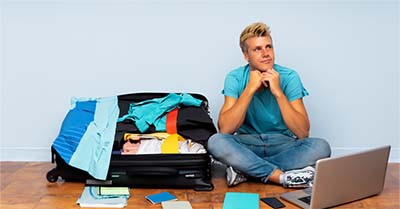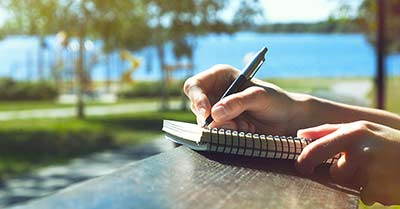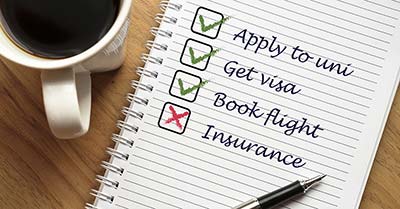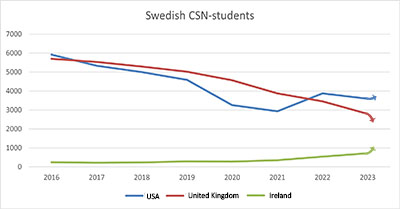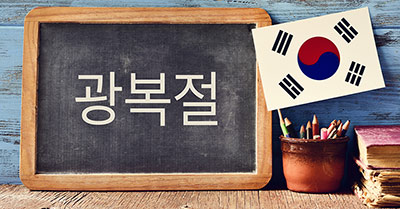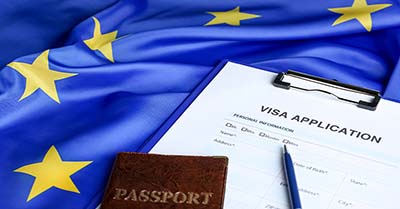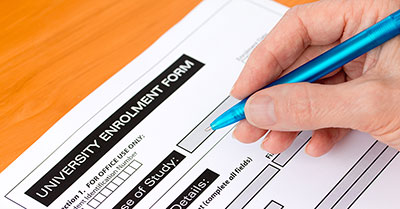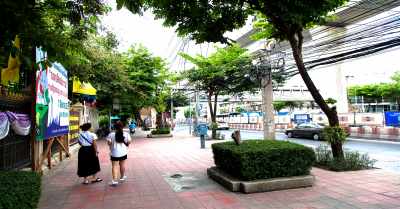Packing list for studying abroad
Your study abroad adventure is about to start and it is time to pack your things for a year abroad. We prepared a list of some things that you should not forget.
Packing list
- Confirmation of enrolment and other important documents from your school. For example information about the first day at school, check-in information for your accommodation etc. The school might also have instructed you to bring certain things so read their information carefully.
- Passport and student visa, without it you will not get far. Also have a pen and accommodation details easily accessible to fill in the landing card that you usually get on the plane before you land in a foreign country. Submit your landing card at the passport control when you arrive.
- Tickets and boarding passes for your trip.
- Your study abroad insurance. If something happens you must be able to show an insurance certificate and have access to the insurance company's contact details. Many schools require you to show proof of your insurance the first day at school. If you are an EU-national studying within EU, you should also bring the European Health Insurance Card.
- Medications and vaccinations. Remember to pack all medicines that you need. It can also be a good idea to include some pain killers and something for your stomach. If you bring strong prescription drugs or large amounts of medicine, you should have a medical certificate from your doctor that explains why you need these medicines. Also check the regulations of the country where you will study. There might be restrictions on what medicines you can bring even if you have a letter from your doctor. Finally, do not forget to take the necessary vaccinations before the trip. Check with a vaccination center what they recommend.
- Adapters and chargers. Do not forget to bring your cell phone charger and chargers for other electrical devices. Also check the plug type and voltage for your destination. You will need an adapter if they use a different plug type and if the voltage differs from your home country devices like hairdriers etc might break or become lazy so consider buying those appliances after you arrive.
- Money and a debit/credit card. Make sure to exchange some local currency before you leave but do not bring too much cash, and do not keep all your money and cards in the same place. If you have a Visa or Mastercard, you can withdraw money and pay at most major shops and restaurants around the world but do not be surprised if some places only take cash.
- Camera: Nowadays cell phones have replaced most compact cameras, however if you are into photography and want to take pictures that you can print and have on your wall at home, it may be good to bring a DSLR or an advanced compact camera. They are significantly faster and better in the dark than a cell phone. Real cameras have better image quality and you can choose between different lenses and focal lengths.
- Find out if sheets and towels are included with your accommodation. Otherwise, you may want to bring them if you have room in your bag. Alternatively, you can buy them shortly after arriving.
- A laptop and/or smart pad might also be handy to bring.
- An ISIC International Student Identity Card that entitles you to student discounts all over the world.
Things to prepare digitally
Nowadays you can bring many things digitally. Here are some good things to prepare:
- Dictionary and language apps. In the past, I always recommended people to bring a small dictionary when studying abroad. Nowadays, it's often easier with an app in your phone, preferably one that works offline. There are also many other apps that can facilitate language learning.
- Document backup: Mail your important documents to a web-based email address. Scan or take photos of your passport, student visa, letter of acceptance, insurance, and important addresses etc.
- Save offline maps and locations. In Google Maps, you can download the map for a city so you can access it offline. You can also highlight important locations such as your school and your accommodation. This way, you can find your way around using Google Maps and GPS even if you don’t have Wifi.
- E-books: Books take a lot of space so why not bring e-books instead.
Luggage on the flight
Check the luggage allowance on your flight before booking. A cheap ticket can quickly become expensive if it only includes carry-on luggage. Flying with over-weight luggage is costly so weigh your luggage before leaving home and only bring what you really need. If you will study in a low cost country it may be better to buy heavy or bulky items after you arrive.
Keep in mind that many things are not allowed in your carry-on luggage. Fluid containers (over 100 ml), scissors and some other things have to be checked in, but always keep your valuables in your carry-on luggage. Have a small bag with the items that you need during the journey easily accessible at your feet while the rest of your carry-on luggage is stored in the luggage compartment above. Most airlines allow you to bring a personal item in addition to your carry-on bag.
Have a nice trip!

